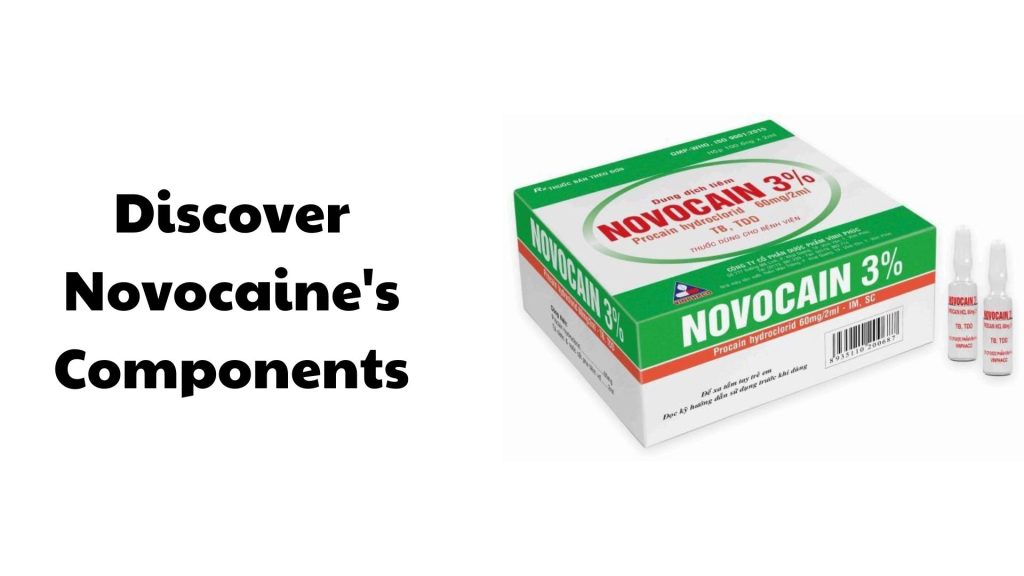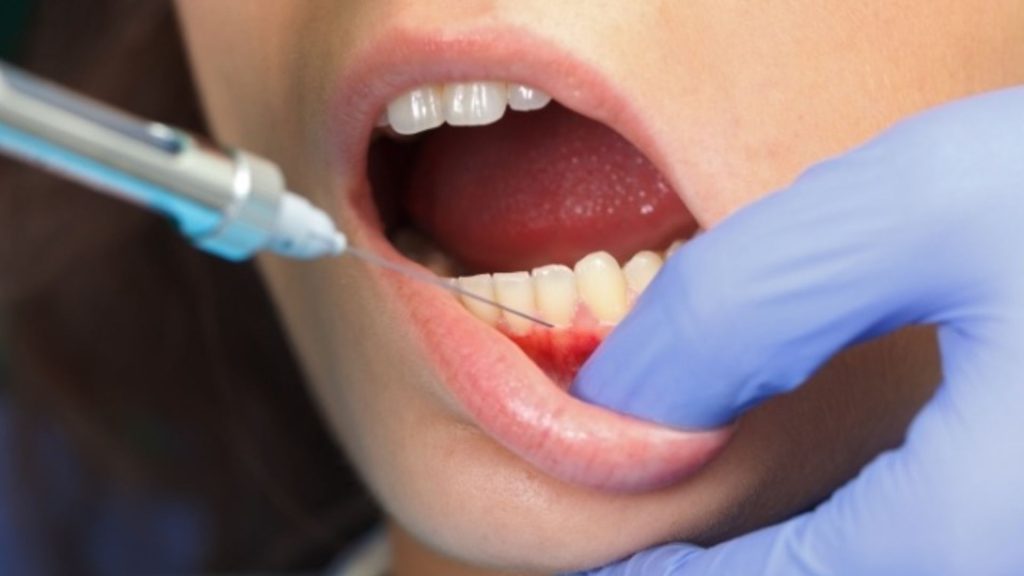How long does it take for novocaine to wear off? In general, Novocaine wears off within 1 to 2 hours of the dental or medical operation. Understanding its effects’ length might help you plan post-procedure activities and ease your fears. Let’s explore this issue to answer you thoroughly.
Discover Novocaine’s Components


Each Novocain tube comprises the following ingredients: Procaine Hydrochloride 60 mg and just enough of the other ingredients for 2 ml. The drug is made as an injection solution, and you should only use it if your doctor or dealer tells you to. In some situations, the drug can be used as spinal anesthesia, injected anesthesia, regional anesthesia, sympathetic or peripheral nerve blocking to ease pain, and so on.
Novocaine Dosage And Usage
The medication is injected directly into the vein. Adjust dosages based on how different people react. Performs peripheral nerve blocking, infiltration anesthesia, and spinal anesthesia.
- Spinal anesthesia: Procaine should be diluted 10% with physiological saline, glucose, purified water, or cerebrospinal fluid. Dilute with a 1/1 to 2/1 ratio depending on the area of anesthetic.
- Injection speed 1ml in 5 seconds. Adrenaline can be mixed to prolong the effect of injectable anesthesia or nerve block.
- Using 0.25 or 0.5% Procaine solution for injectable anesthesia can use a dose of 350 – 600 mg.
- Nerve block: Use a 500 mg amount with 0.5% (100ml), 1% (50ml), or 2% (25ml) fluid. The highest amount is 1000 mg.
- To get better results from treatment, novocaine needs to be given in the right amount, to the right person, and for the right reason.
When Is Novocain Used?


A local anesthetic like novocaine (also called procaine) is often used in dentistry and small surgery to numb or ease pain in a certain area of the body. The following are some common times when Novocaine is used:
Dentistry
Novocaine and other similar anesthetics are often used in dentistry to make people feel less pain and numbness in their mouth and teeth during treatment. Novocaine is used for many things, like making holes in teeth to find cracks or cavities, removing teeth when necessary, making or changing dentures, and even just making someone’s mouth tired. patient to make a mask to keep their teeth safe.
In dentistry, it’s important to use Novocaine and other similar anesthetics to make sure that the patient is relaxed and doesn’t feel any pain during the treatment. However, only trained medical workers should use and administer this drug to make sure it is safe and successful.
Minor Surgery
Novocaine (procaine) or similar anesthetics may also be used for small surgeries to ease pain and numb certain areas before the treatments are done. In minor surgery, Novocaine can be used in the following situations:
- Small tumor removal: Novocaine may reduce discomfort during surgery to remove small tumors or aberrant cells.
- Minor wound repair: If you cut a deep wound or breathe in blood, Novocaine may numb the region, allowing you to avoid agony while it heals.
- Tissue sampling: Novocaine may numb a bodily portion to be sampled for examination or diagnosis, making the collection painless and easy.
Novocaine Side Effects
Procaine, which is what Novocaine is, is a local anesthetic that is often used in dental and less invasive needle operations. When used as advised by a medical expert, Novocain is usually safe and effective. There are a few adverse effects, however, that consumers should be aware of:
- The injection site may stay numb after the Novocain wears off. This normally only lasts a short time before disappearing. There is a potential that the injection site may swell or become red, although this generally resolves itself.
- Novocaine may irritate the skin or create allergies, causing it to become red, itchy, or swollen. If you believe the response is serious, you should visit your doctor or dentist straight away.
However, Novocaine may sometimes cause negative effects that impact the whole body, such as feeling ill, spitting up, or being exhausted. This is more probable if you consume more than the recommended quantity. Finally, major adverse effects like severe allergic responses, low blood pressure, or cardiovascular issues are very infrequent. These negative effects, however, are more common when taking Novocain at greater dosages.
How Long Does It Take For Novocaine To Wear Off?


The duration of the anesthetic effect of novocaine (procaine) varies from patient to patient based on factors such as dosage, injection site, and individual physiology. But Novocain usually keeps working as a tranquilizer for 1-2 hours after it is injected.
Later, Novocain’s numbing effect will start to wear off, and the area will slowly return to normal. People may feel numb for longer or shorter amounts of time, depending on their health and medicine digestion. To stay safe, patients should do what their dentist or doctor tells them to do and stay away from dangerous tasks until the anesthetic goes off. This means not driving or running heavy machinery, not eating or drinking hot drinks to protect the mouth or its lining, and not scoring or cutting teeth while the area is numb.
How To Make Novocaine Wear Off Quickly?
The body releases Novocain and reduces the anesthetic effect naturally, thus it cannot be safely or reliably reduced. However, there are a few things you may do to make Novocain’s numbing effects wear off faster:
Walking
By boosting blood circulation and eliminating the anesthetic from the numbed region, moving gently may help Novocaine (procaine) wear off quickly. This method is often performed after receiving Novocaine during dental treatment or smaller surgeries. Gently flexing the joints, mildly massaging the surrounding muscles, or even pressing strongly on the numb region will assist in stimulating blood circulation and expedite the clearance of Novocain. Talking or swallowing saliva may also be utilized to activate the mouth muscles and improve blood circulation in the numb region. Standing up and walking lightly might also assist in strengthening this impact for those who can. To prevent harm or negative effects, these exercises must be performed lightly and carefully.
Always follow your dentist’s or medical professional’s advice and ensure your safety and comfort during the procedure.
Massage
With massage, the numbing effects of Novocaine (procaine) wear off faster because the massage increases blood flow. Following Novocain in dentistry or minor treatments, this method is utilized. One way to rub the numb area is to use your fingertips to move your fingers in circles or along the numb area while providing light pressure. This helps get the blood moving again and makes Novocain wear off more quickly.
It’s also possible to rub the numb area from the outside but be careful not to put too much pressure on the skin. Massage may be enhanced by applying a kettle (warm water or ice pack) to the numb region.
However, it is critical to massage softly and carefully to prevent causing skin or muscle injury.
Apply Warm Compresses
Warm compresses may help Novocain (procaine) wear off quicker, notably by improving blood circulation and removing the drug’s anesthetic effect. This approach requires a kettle bag or an ice pack wrapped in a clean towel, as well as warm (but not boiling) water:
- To do this, choose the numb location where you want the Novocain to wear off and lay a warm water bag on it. To prevent burns, avoid making direct contact with the hot water bag or ice pack.
- Warm compresses should be applied for no more than 10-15 minutes. You may speak or swallow saliva during this period to engage your mouth muscles and enhance blood circulation.
- To prevent skin harm, heated compresses should only be administered softly and carefully. If you feel uneasy or have any concerns, cease using the warm compress immediately and visit your doctor or dentist to guarantee its safety and efficacy.
Relax
Lay down or sit down somewhere comfy and take it easy until the drugs that numb you wear off. Do not do anything risky or that needs a lot of focus right now to keep yourself and others safe. Some things you shouldn’t do are drive or use big tools.
Also, while Novocain is still working, don’t eat or drink anything hot. This will keep your mouth from getting hurt. Make sure you’re no longer feeling any effects of the anesthesia before going back to your normal routine. This is what your doctor or another medical worker will tell you to do.
Conclusion
When discussing how long it takes for Novocain to wear off, we can’t disregard the importance of excellent oral care. Spring Orchid Dental Clinic is the place to go if you need basic dental check-ups. Our dental professionals will use cutting-edge technology to ensure your comfort and effectiveness throughout treatment. Novocain fades off after treatment, which is critical. For better dental health and a brighter smile, visit Spring Orchid Dental Clinic. Discover the difference with us, where we value your time and ensure you leave the clinic with a confident smile and a sense of well-being following Novocain.
FAQs
Does Novocaine Make You Tired?
No, it isn’t. Procaine (Novocaine) seldom causes weariness or sleepiness. Dental professionals use this local anesthetic to numb regions before operations or small-dose infusions.
However, some people may feel tired or sleepy after getting a Novocaine shot because they were stressed, anxious, or mentally tense before the treatment. As a side effect of dental treatment, Novocain may induce tiredness. After Novocain therapy, you should feel awake again. Rest and recuperate if you’re weary after dental work.
Does Novocaine Hurt?
No, it isn’t. The primary purpose of novocaine (procaine) is to relieve pain in the injected location. Thus, Novocain seldom causes discomfort when administered appropriately. Injecting Novocain by your dentist or healthcare professional may cause a tiny feeling of pressure, but it is not painful. You will feel numb and lose sensation in that location, avoiding discomfort throughout the operation or intervention. The dentist or doctor can operate efficiently and comfortably using Novocain. After the effects of Novocain wear off, the injection site may be uncomfortable, but it normally goes away quickly.
Can Novocaine Make You Sleepy?
Novocaine (procaine) does not frequently induce sleepiness. This is a local anesthetic that is used to numb particular locations prior to dental treatments or infusions.
However, some individuals may feel weary or drowsy after receiving a Novocain injection. The major reason for this syndrome, which is not directly caused by Novocain, is typically tension or worry before the treatment procedure. Do not drive or engage in activities requiring high attention after receiving a Novocain injection and feeling fatigued. Drowsiness normally goes away once the Novocaine effects wear off and you’ve slept a little. Find time to rest and recuperate if you are weary following dental operations or Novocaine injections.





